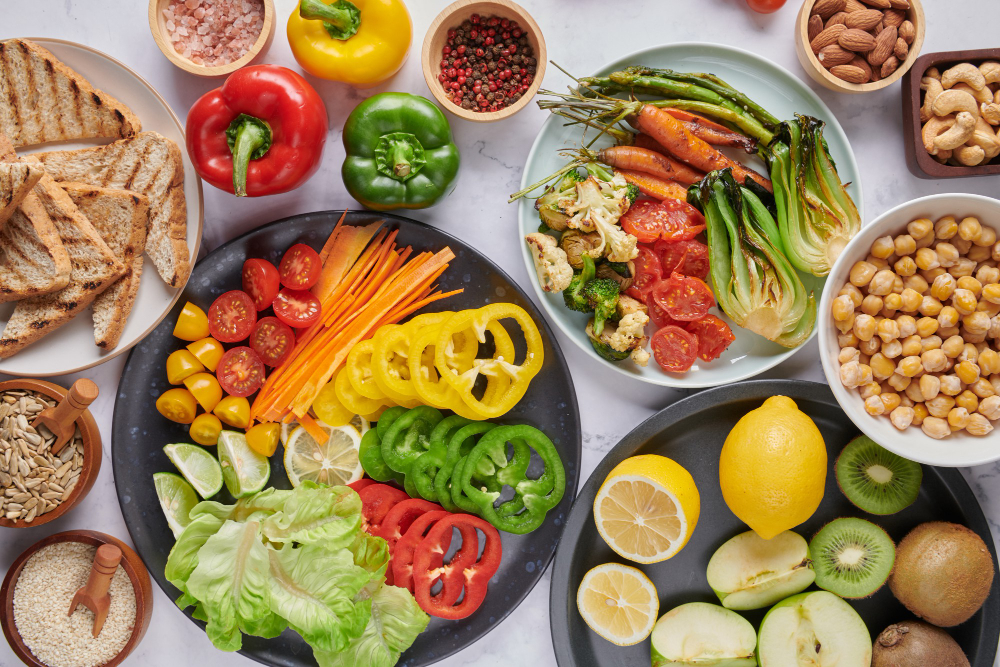Pregnant? Hungry? Are you looking for a snack that will fill your stomach and feed your baby?
Pregnant women must ensure that their food has sufficient nutrients and energy for the baby’s proper development and growth. They must also ensure that her body is healthy enough to cope with the changes taking place. The mother’s diet must be balanced and nutritious for a healthy pregnancy, including the appropriate mix of proteins, carbs, and fats and ingesting a wide variety of plants such as vegetables and fruits.
Checking with a doctor is crucial for selecting a pregnancy diet because some women’s diets may be influenced by ethical values, religious requirements, or health conditions. Here are some suggestions for a healthy pregnancy diet, including what to eat and what not to consume.
Fruits And Vegetables
Aim for five fruit and vegetable servings every day. They come in various forms, including juice, dried, tinned, frozen, and fresh. Vitamin and other nutrient levels are frequently higher in fresh and frozen fruit (if frozen soon after plucking).
Experts say that eating fruit rather than drinking juice is usually better for you because juice contains a lot of natural sugar. Vegetable juices like carrot or wheatgrass can provide a lot of nourishment.
Protein
Fish, lean pork, poultry, and eggs are all excellent sources of animal protein. The following foods should be considered as good sources of protein by all pregnant women, especially vegans:
- Quinoa is a “complete protein” that contains all of the essential amino acids.
- Soy products and tofu
- Protein and iron are abundant in beans, lentils, legumes, nuts, seeds, and nut butter.
In the journal PLoS ONE, British and Brazilian researchers found that pregnant women who ate seafood had lower anxiety levels than those who did not. The authors found that pregnant mothers who never ate seafood had a 53 percent higher probability of experiencing significant anxiety levels.
Carbohydrate-rich food
Potatoes, rice, pasta, and bread are examples of starchy carbohydrate-rich foods. Carbohydrates are an essential part of a healthy pregnancy diet since they are high in energy.
Fats
The fat intake of a pregnant woman should not exceed 30% of her total calories. We discovered that prenatal exposure to a high-fat diet changes gene expression in offspring’s livers, making them more prone to overproduce glucose, leading to early insulin resistance and diabetes. Olive oil, peanut oil, sunflower oil, sesame oil, canola oil, avocados, and various nuts and seeds are high in monounsaturated fats.
Fibrous Food
Fibre is plentiful in whole grain foods, including wholemeal bread, wild rice, whole grain pasta, pulses like beans and lentils, fruit, and vegetables. Constipation is more common in women during pregnancy, and eating plenty of fibre can help to reduce that risk. According to studies, haemorrhoids, which become more common as the baby grows, can be reduced by consuming a high-fibre diet throughout pregnancy.
Calcium
It is critical to consume a sufficient amount of calcium regularly. Calcium is rich in dairy foods such as cheese, milk, and yoghurt. Calcium-fortified soymilk and other plant milk and juices, calcium-set tofu, soybeans, bok choy, broccoli, collards, cabbage, okra, mustard greens, beans, kale, and soy nuts should all be considered if the mother is vegan.
Dairy Products
Dairy foods, including milk, yoghurt, and cheese, are rich in protein and vitamin D sources in the diet. Dairy is the most important source of calcium in the diet and phosphorus, B vitamins, magnesium, and zinc. Greek yoghurt, in particular, has more calcium than most other dairy products and is therefore very useful.
Zinc
Zinc is an important trace mineral. It is essential for normal growth and development, cellular integrity, and various biological processes such as nucleic acid metabolism and protein synthesis.
Zinc is essential for the fetus’s development since all of these processes are involved in growth and cell division. Chicken, turkey, ham, shrimp, crab, oysters, meat, fish, dairy products, beans, peanut butter, almonds, sunflower seeds, ginger, onions, bran, wheat germ, rice, pasta, cereals, eggs, lentils, and tofu are the richest sources of zinc.
Food To Avoid During Pregnancy
- When you’re pregnant, stay away from alcohol. Premature birth, intellectual handicap, birth abnormalities, and low birth weight newborns have all been connected to alcohol.
- It should limit caffeine intake to 300 mg per day. The amount of caffeine in different drinks varies depending on the beans or leaves used and how they were cooked. On average, an 8-ounce cup of coffee contains 150 mg of caffeine, whereas black tea contains roughly 80 mg. Caffeine levels in a 12-ounce drink or caffeinated soda range from 30 to 60 mg.
- Limit your daily cholesterol intake to 300 mg or less.
- Shark, swordfish, farmed salmon (wild salmon is fine), king mackerel, and tilefish (commonly known as white snapper) are high mercury. The central nervous system of your infant can be harmed by too much mercury.
- Raw fish, especially shellfish like oysters and clams, should be avoided.
In The End!!!
Your baby is salivating at the possibility of eating all of the nutrient-dense foods found in a well-balanced diet of whole grains, fruits and vegetables, lean meats, and healthy fats. As your blood volume increases throughout pregnancy, it’s critical to drink enough water. Constipation and urinary tract infections can both be avoided with adequate drinking.





 Importance of Health Policies and Procedures
Importance of Health Policies and Procedures